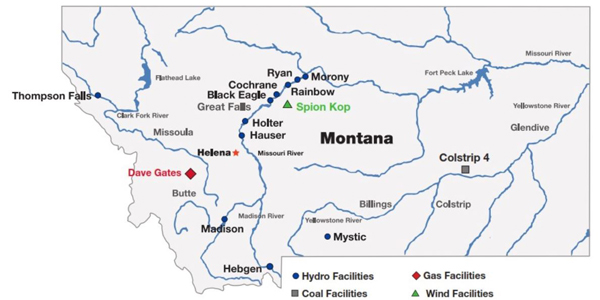FERC has accepted a settlement between WECC and NorthWestern Energy for violations of NERC reliability standards, under which the utility will pay $205,000 to the regional entity in addition to performing other mitigation activities.
NERC submitted the settlement to FERC in a notice of penalty in January, which the commission on Friday indicated it would not review (NP21-6), letting the penalty stand. The NorthWestern penalty was the only settlement publicly disclosed by NERC in January, but because of a rule change last year, the organization may limit or withhold disclosure of information relating to violations of the ERO’s Critical Infrastructure Protection (CIP) standards. (See FERC, NERC to End CIP Violation Disclosures.)
Tree Growth Leads to Line Failure
NorthWestern’s settlement stems from violations of FAC-003-4 (transmission vegetation management), specifically requirements R2, which requires applicable transmission owners and generator owners to keep vegetation from encroaching on a line’s minimum vegetation clearance distance (MVCD), and R6, which mandates that 100% of transmission lines be inspected at least once a year for vegetation encroachment. The violation of R2 was self-reported, while WECC discovered the second violation via a subsequent compliance audit.
In its self-report submitted Aug. 21, 2018, NorthWestern told WECC it had discovered two encroachments into the MVCD of its 230-kV transmission line, each of which caused a high-voltage flashover resulting in a sustained outage.
The first encroachment was addressed on Aug. 10 when a crew performing a line patrol found a tree growing within the MVCD and removed it at the groundline, causing a flashover and outage that was restored within several hours. The next day a tree-clearing crew returned to remove additional trees along the same line. However, during clearing operations a second flashover and outage occurred, which the utility believed was caused by a different stem of the tree removed the day before. NorthWestern re-energized the line the same day after the remaining trees were cleared.
With both outages restored and the line cleared, the utility ordered a follow-on inspection across all of its bulk electric system transmission lines in case it had missed any other potential vegetation issues. This inspection was completed by Aug. 15, identifying nine additional areas in danger of encroachment and requiring corrective action plans to resolve.
Inspections Leave Room for Improvement
After NorthWestern submitted its self-report to WECC, the RE ordered an investigation from Nov. 27, 2018 through March 20, 2019, to identify potential noncompliance with Requirement R6. The investigation found that while the utility did conduct annual vegetation inspections, these “[relied] solely on … aerial patrols.”
Ground patrols were performed in areas where aerial inspection found potential problems, but WECC said this system was insufficient because the patrols were conducted “during the late to early spring season, [when] much of the vegetation is devoid of foliage.” This meant inspectors had trouble foreseeing the risk that vegetation might pose following periods of high rain later in the year.
Both violations posed a “serious and substantial risk to the reliability of the bulk power system,” according to WECC. While no load was lost because of the R2 violation that caused two outages Aug. 10-11, the RE noted the affected line connected to other 230-kV lines, as well as a switchyard handling both 100-kV and 230-kV lines. As a result, the outages led to a risk of “cascading or widespread outages.”
The R6 violation was assessed at the same risk level because it had led directly to the R2 violation. In addition, the fact that NorthWestern’s subsequent inspection found additional areas of concern clearly demonstrated that its annual aerial patrols were not enough to satisfy the requirements of the standard.
The utility submitted a mitigation plan to address these violations to WECC in June 2019. The plan built on the vegetation removals from the affected line, along with the full aerial assessment, with improvements to the utility’s vegetation management program. Features of the new plan include a second annual aerial inspection conducted in mid-summer; a requirement for ground assessments at water crossings; and technology enhancements to improve data collection consistency, assessment results and response time.
WECC confirmed the completion of NorthWestern’s mitigation plan on Dec. 31, 2019. The RE’s penalty assessment was based on the violation risk factor, which was high for the R2 violation and medium for the other, and the violation severity level, which was severe in both cases. In addition, both infringements lasted more than 160 days, exceeding the time horizon expected for remediation of one hour in the case of R2 and one day in the case of R6.
Mitigating credits were applied in light of the utility’s cooperation throughout the process and the timeliness of its initial self-report from the date of discovering the R2 issue. In addition, it did not fail to complete any applicable compliance directives, submitted all requested documentation on time and made no apparent attempt to conceal the violation. WECC determined that NorthWestern’s management was not involved in and did not condone the actions that led to the noncompliance.





